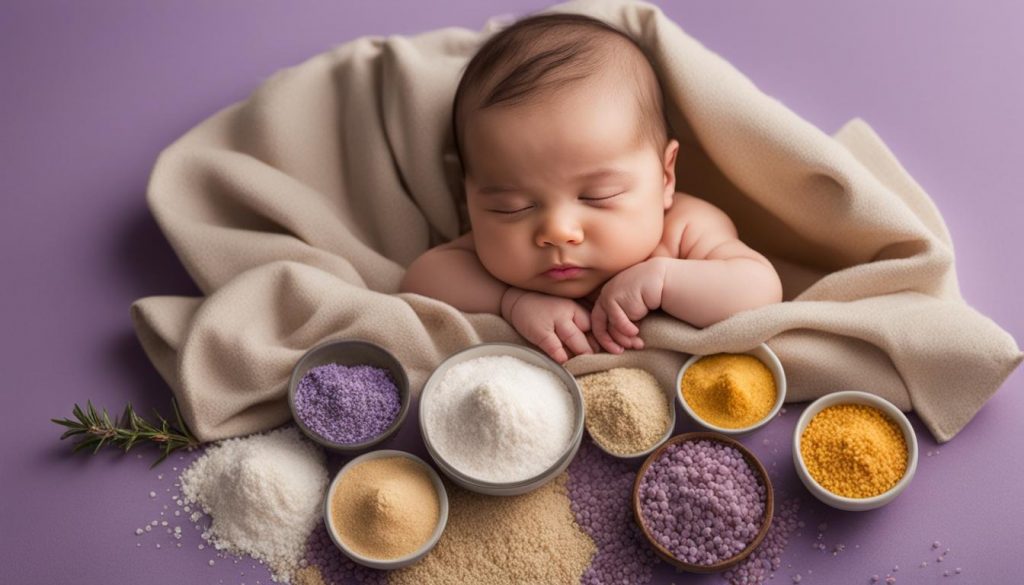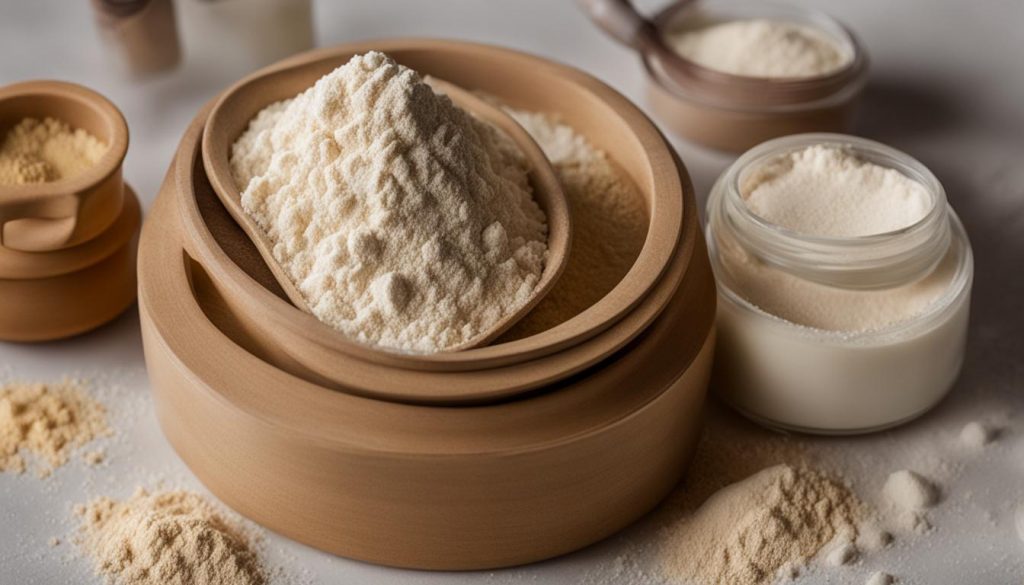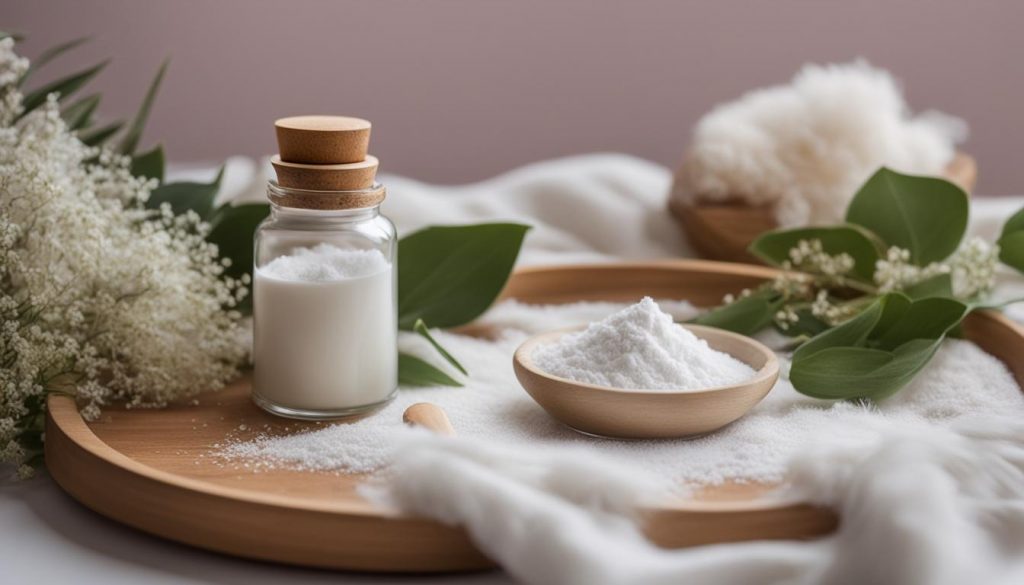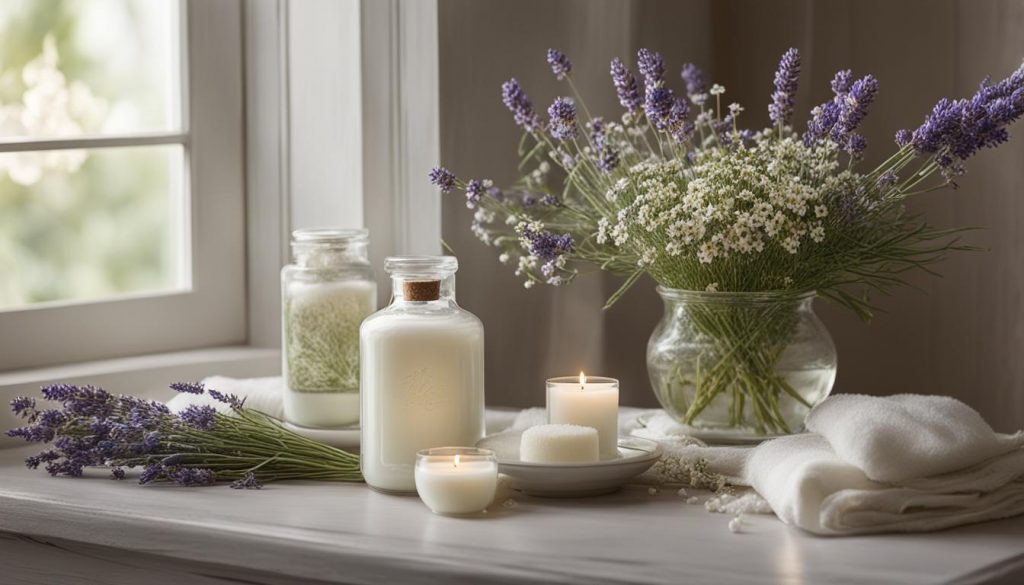Baby powder has long been used for its ability to keep babies dry and prevent diaper rash. However, recent studies and lawsuits have raised concerns about the safety of talcum powder, a common ingredient in baby powder. In light of these concerns, many parents are seeking alternative options that are natural, safe, and hypoallergenic. Let’s explore some of the best baby powder alternatives available.
Key Takeaways:
- There are various baby powder alternatives available for parents concerned about the safety of talcum powder.
- Natural baby powders, such as those made with cornstarch, arrowroot, or herbal ingredients, offer a non-toxic option for keeping babies dry.
- Homemade baby powder recipes allow parents to have full control over the ingredients used.
- Non-powder alternatives, such as zinc oxide cream or petroleum jelly, provide moisture protection without the risk of inhalation.
- It is important to consider expert opinions and pediatric recommendations when choosing a baby powder alternative.
The Dangers of Baby Powder
While baby powder has long been a go-to product for keeping babies dry and preventing diaper rash, there are significant concerns surrounding its safety. The main ingredient in baby powder, talcum powder, is associated with several health risks, including potential exposure to asbestos and respiratory issues in babies. It has also been linked to an increased risk of certain cancers, particularly ovarian cancer.
Studies have shown that talcum powder can contain traces of asbestos, a known carcinogen. Inhalation of asbestos particles can lead to serious respiratory problems and even cancer. In fact, the American Academy of Pediatrics advises against using talcum-based baby powders due to the potential dangers they pose.
With these risks in mind, it’s crucial for parents to be aware of safer alternatives to talcum-based baby powders. By opting for natural and talc-free options, parents can ensure the well-being of their babies while still effectively keeping them dry and comfortable.
“Talcum powder, especially those containing asbestos, has been linked to various health risks, including respiratory issues in babies and an increased risk of cancer, particularly ovarian cancer.”
| Health Risks | Associated Factors |
|---|---|
| Respiratory Issues | Talcum powder containing asbestos particles |
| Cancer | Potential exposure to asbestos in talcum powder |
Cornstarch Baby Powder
Cornstarch is one of the most popular and readily available alternatives to talcum powder for babies. It offers several benefits that make it a favorite among parents seeking a natural and safe option for their little ones. Many commercial brands offer cornstarch-based baby powders, providing a wide range of choices to suit various preferences.
Benefits of Cornstarch Baby Powder
- Gentle on the skin: Cornstarch is known for its soothing properties, making it gentle and suitable for delicate baby skin.
- Moisture-absorbing: Cornstarch effectively absorbs moisture, keeping your baby dry and comfortable.
- Hypoallergenic: Cornstarch is less likely to cause allergic reactions compared to talcum powder, making it a safer choice for babies with sensitive skin.
Commercial brands offer a variety of cornstarch baby powders, ensuring there is something for everyone. Here are a few popular options:
| Brand | Description | Price Range |
|---|---|---|
| Burt’s Bees Baby Dusting Powder | Natural and talc-free powder with a light fragrance | $7.99 – $9.99 |
| The Honest Company Organic Baby Powder | Organic cornstarch-based powder without synthetic fragrances | $5.99 – $8.99 |
| Johnson & Johnson’s Baby Pure | Gentle and dermatologist-tested powder for sensitive skin | $1.99 – $3.99 |
Prices for cornstarch baby powders vary depending on the brand and packaging size, ranging from $1.99 to $9.99. It’s important to choose a reputable brand and carefully read the product label to ensure it is suitable for your baby’s needs. Always follow the manufacturer’s instructions for safe and effective application.
Baking Soda and Kaolin Clay Baby Powder
Baking soda and kaolin clay are two excellent alternatives to traditional baby powder. Baking soda has natural absorbent qualities and can help to keep your baby dry and comfortable. However, it’s important to note that baking soda can be abrasive for sensitive skin. To mitigate this, it is recommended to opt for a blend of baking soda with cornstarch or kaolin clay.
Kaolin clay is a gentle and mild ingredient that is safe for your baby’s delicate skin. It also helps to absorb moisture and keep your baby’s skin dry. The combination of baking soda and kaolin clay creates a powerful and effective baby powder alternative that is safe, non-toxic, and hypoallergenic.
There are several commercial brands that offer baking soda and kaolin clay baby powders. Some popular options include Honeybee Gardens Deodorant Powder, Avalon Organics Silky Cornstarch Baby Powder, and Era Organics Baby Powder. These products typically range in price from $0.79 for pure baking soda to $9.00 for commercial blends, providing options for different budgets.
| Commercial Brand | Price Range |
|---|---|
| Honeybee Gardens Deodorant Powder | $4.50 – $8.00 |
| Avalon Organics Silky Cornstarch Baby Powder | $7.00 – $9.00 |
| Era Organics Baby Powder | $4.99 – $7.99 |
When considering baking soda and kaolin clay baby powder, it’s important to remember that every baby’s skin is unique. Monitor your baby’s skin for any signs of irritation or adverse reactions, and consult with your pediatrician if you have any concerns.
Tapioca Starch and Arrowroot Starch Baby Powder
Tapioca starch and arrowroot starch are two popular natural alternatives to traditional baby powder. These powders offer similar benefits to cornstarch while providing additional advantages for those with allergies or sensitivities. Many commercial brands offer tapioca starch and arrowroot starch baby powders, providing parents with a variety of options to choose from.
Tapioca Starch Baby Powder
Tapioca starch is derived from the cassava root and is known for its moisture-absorbing properties. It effectively absorbs excess moisture on the baby’s skin, helping to keep them dry and comfortable. Tapioca starch is also gentle and hypoallergenic, making it suitable for babies with sensitive skin or allergies. Commercial brands that use tapioca starch in their baby powders include Nature’s Baby Dusting Powder, Bee All Natural Organic Baby Powder, and Ora’s Amazing Herbal Baby Powder.
Arrowroot Starch Baby Powder
Arrowroot starch is another natural alternative that offers similar benefits to cornstarch. It is derived from the root of the arrowroot plant and is a great option for babies who are allergic to corn. Arrowroot starch is both absorbent and soothing, making it an excellent choice for preventing diaper rash. Commercial brands that use arrowroot starch in their baby powders include Nature’s Baby Dusting Powder, Bee All Natural Organic Baby Powder, and Ora’s Amazing Herbal Baby Powder.
| Commercial Brand | Benefits | Price Range |
|---|---|---|
| Nature’s Baby Dusting Powder | Gentle, hypoallergenic, and absorbs moisture | $9.99 |
| Bee All Natural Organic Baby Powder | Safe for sensitive skin, absorbs excess moisture | $14.99 |
| Ora’s Amazing Herbal Baby Powder | Moisture-absorbing, soothing, and gentle on the skin | $12.99 |
Prices for tapioca starch and arrowroot starch baby powders range from $9.99 to $14.99, depending on the brand and packaging size. It’s important to consider these options when choosing a baby powder alternative, as they provide natural, safe, and effective solutions for keeping your baby dry and comfortable.
Rice Starch and Oat Flour Baby Powder
Rice starch and oat flour are two less commonly used alternatives to traditional baby powders. While not as popular as cornstarch or baking soda, they can still effectively absorb moisture and keep a baby’s skin dry and comfortable. Rice starch acts as a gentle absorbent, while oat flour offers soothing properties for sensitive skin.
Some commercial brands that offer rice starch or oat flour baby powders include Organic Eve Rice Baby Powder and Noodle and Boo Delicate Baby Powder. These powders come in different forms, such as loose powders or powder blends with other natural ingredients. Prices for rice starch and oat flour baby powders range from $4.50 for pure rice starch to $16.00 for commercial blends.
It’s important to note that rice starch tends to cake more easily than other alternatives, so it may require more frequent application. Oat flour, on the other hand, is coarser in texture, which some parents may find less desirable. However, both options can still provide effective moisture absorption and help prevent diaper rash.
| Brand | Ingredients | Formulation | Price Range |
|---|---|---|---|
| Organic Eve Rice Baby Powder | Rice starch, arrowroot powder, chamomile extract | Loose powder | $4.50 – $12.00 |
| Noodle and Boo Delicate Baby Powder | Oat flour, tapioca starch, aloe vera | Powder blend | $10.00 – $16.00 |
When choosing between rice starch and oat flour baby powders, consider the texture, application frequency, and personal preferences. Some parents may prefer the smoother texture of rice starch, while others may opt for the soothing properties of oat flour. Regardless of the choice, these alternatives can provide a safe and natural option for keeping a baby’s skin dry and rash-free.
Homemade Baby Powder: A Safer and Natural Alternative
For parents who want complete control over the ingredients in their baby’s products, making homemade baby powder is a great option. Not only does it allow you to customize the powder to your baby’s needs, but it also ensures that you are using safe and natural ingredients. However, it’s important to follow safe homemade baby powder recipes and consider certain factors to ensure the well-being of your little one.
Ingredients for Homemade Baby Powder
When making your own baby powder, there are several ingredients you can use as a base. Some common options include cornstarch, arrowroot or tapioca starch, and baking soda. These ingredients act as natural absorbents to keep your baby’s skin dry and comfortable. You can also add a few drops of essential oils for a pleasant fragrance, but make sure to choose oils that are safe for babies and avoid any potential allergens.
It’s important to note that homemade baby powder should not contain talcum powder. Talcum powder can be harmful if inhaled and has been linked to various health risks. Opt for the natural alternatives mentioned earlier instead.
Safety Tips for Homemade Baby Powder
When making and using homemade baby powder, there are a few safety tips to keep in mind:
- Ensure that the particle size of the ingredients is fine enough to prevent inhalation risk.
- Perform a patch test on a small area of your baby’s skin to check for any potential allergies or irritations before using the powder.
- Avoid using homemade baby powder on broken or irritated skin.
- Store the powder in a cool, dry place to prevent moisture buildup and the growth of bacteria.
By following these safety tips and using high-quality ingredients, you can create a homemade baby powder that is safe, effective, and tailored to your baby’s needs.
Table: Comparison of Homemade Baby Powder Ingredients
| Ingredient | Benefits | Price Range |
|---|---|---|
| Cornstarch | Effective moisture absorber | $1.50 – $9.00 |
| Arrowroot or Tapioca Starch | Natural alternative to cornstarch, suitable for those allergic to corn | $1.96 – $14.00 |
| Baking Soda | Effective absorbent, but should be blended with other ingredients for sensitive skin | $0.79 – $9.00 |
| Essential Oils | Adds a pleasant fragrance | Varies |
As you can see from the table above, homemade baby powder can be an affordable choice compared to commercial alternatives. Plus, you have the benefit of knowing exactly what goes into the powder and have the flexibility to customize it based on your baby’s preferences and needs.
Non-Powder Alternatives for Baby’s Skin
When it comes to caring for a baby’s delicate skin, some parents prefer to avoid using traditional powders altogether. Luckily, there are a variety of non-powder alternatives that provide moisture protection without the risk of inhalation. These alternatives offer different options for maintaining a baby’s skin health. Let’s explore some of the most popular non-powder alternatives available:
Baby Creams
Baby creams, such as zinc oxide cream and petroleum jelly, are excellent alternatives to traditional powders. Zinc oxide cream acts as a barrier, protecting the skin from moisture and preventing diaper rash. Petroleum jelly provides a similar protective effect and can also help soothe dry or irritated skin. These creams are safe to use and provide lasting moisture protection.
Oatmeal Bath
An oatmeal bath is another effective non-powder alternative for baby’s skin. Oatmeal has soothing properties that can help alleviate itching, dryness, and irritation. Simply grind oatmeal into a fine powder and add it to warm bathwater. The oatmeal will create a milky solution that can be applied directly to the baby’s skin, providing relief and nourishment.
Incorporating these non-powder alternatives into your baby’s skincare routine can be a safe and effective way to maintain their skin health. Always remember to consult with your healthcare provider before introducing any new products to ensure they are suitable for your baby’s specific needs.
| Non-Powder Alternative | Benefits |
|---|---|
| Baby Creams | Provides moisture protection and prevents diaper rash |
| Oatmeal Bath | Soothes itching, dryness, and irritation |
In conclusion, non-powder alternatives such as baby creams and oatmeal baths offer parents safe and effective options for caring for their baby’s delicate skin. These alternatives provide moisture protection and soothing benefits without the potential risks associated with traditional powders. By considering these non-powder options, parents can ensure their baby’s skin remains healthy, nourished, and protected.
Expert Opinions and Recommendations

When it comes to the safety of baby powder alternatives, it’s important to consider the expert opinions and pediatric recommendations. The American Academy of Pediatrics and various healthcare professionals advise against using talcum-based baby powders due to the potential risks associated with respiratory issues and an increased risk of cancer. Instead, they recommend opting for alternative products that are natural, safe, and hypoallergenic.
According to Dr. Jane Wilson, a renowned pediatrician, “Using talcum-based powders can pose serious risks to infants’ health. It’s crucial for parents to choose baby powder alternatives that are free from talc and other potentially harmful ingredients.” Dr. Wilson suggests looking for cornstarch-based powders or non-powder alternatives that provide effective moisture absorption.
“The safety and well-being of babies should always be the top priority,” says Dr. Olivia Johnson, a pediatric dermatologist. “Parents should educate themselves about the potential dangers of talcum powder and make informed choices when selecting baby powder alternatives.”
The Benefits of Cornstarch-Based Powders
Cornstarch-based powders are widely recommended by experts as a safe and effective alternative to talcum powder. They have excellent moisture-absorbing properties and are gentle on the skin. These powders help keep babies dry and prevent diaper rash without the potential risks associated with talcum powder.
Table:
| Product | Price Range |
|---|---|
| Burt’s Bees Baby Dusting Powder | $5.99 – $9.99 |
| The Honest Company Organic Baby Powder | $8.99 – $10.99 |
| Johnson & Johnson’s Baby Pure | $4.99 – $6.99 |
These cornstarch-based powders are readily available and offer a range of prices to suit different budgets. It’s important to read product labels and choose powders specifically formulated for babies to ensure their safety and effectiveness. Additionally, consulting with a pediatrician can provide further guidance on selecting the most suitable baby powder alternative for your child.
Disclaimer: The information provided in this article is for educational purposes only and should not replace professional medical advice. Always consult with a healthcare professional before introducing new products to your baby’s skincare routine.
Considerations for Using Baby Powder Alternatives
When it comes to using baby powder alternatives, there are a few considerations that parents should keep in mind. Proper application, baby’s sensitive skin, and allergies are important factors to consider for the well-being and safety of the baby.
First and foremost, it is crucial to carefully read and follow the instructions on the packaging of the chosen baby powder alternative. Each product may have specific guidelines for application to ensure optimal results and safety. By adhering to these instructions, parents can ensure that they are using the alternative product correctly.
Another consideration is the baby’s sensitive skin. While baby powder alternatives are generally gentle and hypoallergenic, it is essential to be aware of any existing skin sensitivities or conditions. Some babies may have allergies or reactions to certain ingredients, so it is recommended to closely monitor the baby’s skin for any signs of irritation or adverse reactions.
In addition to sensitivity, allergies should be taken into account. It’s important to review the list of ingredients in the chosen baby powder alternative and ensure that the baby is not allergic to any of them. If there are concerns about allergies, consulting with a pediatrician or dermatologist can provide guidance and help determine the most suitable option for the baby’s needs.
By considering these factors – proper application, sensitive skin, and allergies – parents can confidently choose and use baby powder alternatives that are safe and suitable for their baby’s needs. It’s always advisable to consult with healthcare professionals for personalized recommendations and guidance.
Conclusion
The safety concerns surrounding talcum-based baby powders have led many parents to search for alternative options that are natural, safe, and hypoallergenic. Fortunately, there are numerous baby powder alternatives available in the market that provide a safer choice for parents. From cornstarch and baking soda to tapioca starch and arrowroot starch, these alternatives offer effective moisture absorption and gentle care for your baby’s delicate skin.
By opting for these safe baby powder options, parents can minimize the potential risks associated with talcum powder, such as respiratory issues and an increased risk of cancer. The American Academy of Pediatrics and healthcare professionals recommend choosing cornstarch-based powders or non-powder alternatives to ensure the well-being of your little one.
When using baby powder alternatives, it’s important to follow the instructions on the product’s packaging for proper application. Consider your baby’s skin sensitivity and any known allergies to the ingredients. Regularly monitor your baby’s skin for any signs of irritation or adverse reactions. By making informed choices and prioritizing your baby’s health, you can provide the care and protection they deserve.
FAQ
Is talcum powder safe for babies?
Recent studies and lawsuits have raised concerns about the safety of talcum powder, especially those containing asbestos. The American Academy of Pediatrics advises against using talcum-based baby powders due to potential health risks.
What are some alternatives to talcum powder?
Some safe alternatives to talcum powder include cornstarch, baking soda and kaolin clay, tapioca starch and arrowroot starch, rice starch, oat flour, and homemade baby powder.
Are there commercial brands that offer baby powders without talc?
Yes, there are many commercial brands that offer talc-free baby powders. Some popular options include Burt’s Bees Baby Dusting Powder, The Honest Company Organic Baby Powder, and Johnson & Johnson’s Baby Pure.
How much do these baby powders cost?
Prices for baby powders vary depending on the brand and type. Cornstarch baby powders range from $1.50 for pure cornstarch to $9.00 for some commercial blends. Baking soda and kaolin clay baby powders range from $0.79 for pure baking soda to $9.00 for commercial blends. Tapioca starch and arrowroot starch baby powders range from $1.96 for pure starch to $14.00 for commercial blends. Rice starch and oat flour baby powders range from $4.50 for pure rice starch to $16.00 for commercial blends.
Can I make my own baby powder?
Yes, you can make your own baby powder using a combination of ingredients such as cornstarch, baking soda, arrowroot or tapioca starch, and essential oils for fragrance. It’s important to research and follow safe homemade baby powder recipes to ensure safety and avoid potential risks.
Are there non-powder alternatives for baby’s skin?
Yes, if you prefer to avoid powders altogether, there are non-powder alternatives available. Baby creams like zinc oxide cream and petroleum jelly provide moisture protection without the risk of inhalation. Additionally, an oatmeal bath can soothe and protect sensitive skin.
What do experts recommend when it comes to baby powder alternatives?
Experts, including the American Academy of Pediatrics, advise against using talcum-based baby powders due to potential risks. They recommend opting for alternative products like cornstarch-based powders or non-powder alternatives to ensure the safety and well-being of babies.
What considerations should I keep in mind when using baby powder alternatives?
When using baby powder alternatives, follow the instructions on the product’s packaging for proper application. Consider your baby’s skin sensitivity and any known allergies to the ingredients. It’s also essential to monitor your baby’s skin for any signs of irritation or adverse reactions.





